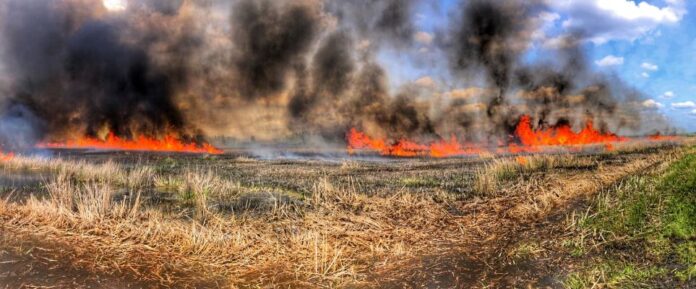Theo de Jager
In a blink of an eye disasters can destroy family farms that have been established for generations. Hail storms, drought, floods, intense cold and fires can have devastating consequences for fruit, grain or vegetable crops or for livestock, destroying such a farm and causing a family to lose their home, land and livelihood.
The past winter was characterised by widespread fires in which livestock died and infrastructure such as fences, stores and homes, but also pastures and plantations, were destroyed. Many of these fires were started.
There are radicals in South Africa that are intent on setting fire to farms in windy conditions, and then running away. The fact that they get away with it, spurs them on. Illegal trespassers on farms, whether it is people fishing, hunters with dogs or honey collectors, also start many fires. In nature honey is harvested by setting grass or leaves alight so that the smoke can drive the bees away, and that burning or smouldering material then flare up in the wind.
Farms are further away from municipal fire departments, if they still exist or are functional in the nearest rural town. Farmers are for the greater part at the mercy of their own capacity, fire-fighting skills and equipment. Any fire is everyone’s fire, and even if farmers are well organised to assist one another in fires, the task is life-threatening and often impossible due to the wind and terrain.
Fire insurance is available everywhere, but very expensive. The prevalence of arson means that South African farmers have to pay much more on their premiums, and this easily eats a farmers’ profit
Given the impact that the widespread loss of experienced family farmers can have on the economy of a district or a region, most countries with which South African farmers compete on international markets have a state disaster relief scheme. The state intervenes and assists after such a fire or other natural disaster to keep farmers on their farms, even is it only with transport, replacement schemes, debt relief or subsidies. In South Africa it is ad hoc and a big bonus if farmers receive state aid.
For several years now, private initiative has replaced the disaster relief responsibility of the state. There are a dozen national organisations that have successfully joined forces and networks to get disaster relief on farms including Saai, Gift of the Givers, AfriForum, TLU-SA, Save the Sheep, Boere in Nood, Caring Daisies and Agri NW. The collaboration takes place under the banner of Manna vir die Boere, and has kept thousand of farmers on their famers through donations and other assistance.
However, it is clear that the authorities must act stricter to stop arson. Arsonists often get off scot-free and is released on bail, without even making a formal bail application to the court. Saai’s parliamentary amendment, which proposes that arson be adjusted to a Schedule 5 crime, will prevent the latter. A Schedule 5 crime is viewed in a more serious light and therefore results in offenders not just being allowed to be released on bail.
Farmers, who accept responsibility for fighting fires themselves, know this, but it is time that more people understand the extent of the crisis and realise that it not only affects the agricultural communities, but also the wider society.
The call for action is therefore clear: share your experience of arson incidents with Saai to give more weight to the parliamentary amendment: https://saai.org/en/stop-the-fires/








